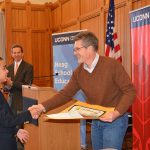“I am a Professor of Educational Psychology at the Neag School of Education at the University of Connecticut. My background is more in cognitive psychology (how people think). I study creativity – what it is, how to measure it, the positive outcomes, and how to nurture it. It sounds silly to both creative types and scientific types (the former thinks it’s pointless and the latter think it’s impossible), but my goal is to help creative people,” says James Kaufman.
“It’s not until they actually get out into the field, and see that they may be working in a place with English language learners, where they may think, ‘Oh, this might be an option for me to be a bilingual teacher or a TESOL teacher’,” Elizabeth Howard said. “And if they don’t land in a place, in a district, where there’s a high incidence of English learners, then it would not occur to them at all necessarily, they wouldn’t see the need for it.”
“College freshmen across Connecticut have unpacked their bags and gone through orientation, and are starting to adjust to life with a roommate,” says Drs. Richard and Kristin Schwab. “Now, after they worked hard to get to college and along with their families made sacrifices to attend, we offer a few suggestions to make the best of these next few years.”
Congratulations to our Neag School alumni, faculty, staff, and students on their continued accomplishments inside and outside the classroom.
Jason Courtmanche ’91 (CLAS), Ph.D. ’06 has been serving in a variety of capacities at the University of Connecticut for 23 years. A lecturer in the University’s English department, an assistant coordinator of the Early College Experience English program, and affiliate faculty in the Neag School’s Department of Curriculum and Instruction, he primarily serves as director of the Connecticut Writing Project (CWP), which immerses Connecticut teachers in an intensive writing program where they grow as writers, learn about teaching writing, and have the opportunity to become published in one of CWP’s literary magazines.
In this episode of the of TeacherCast Podcast, we welcome ASCD Author Dr. Ronald Beghetto on the program to discuss his new book What If? Building Students’ Problem-Solving Skills Through Complex Challenges.
This fall, the Neag School of Education invites submissions for several award and/or funding opportunities, including the 2019 Neag School Alumni Awards, the Rogers Educational Innovation Fund, and the Zirkel Distinguished Teaching Award.
Listen in to Neag School Associate Dean Del Siegle, director of the National Center for Research on Gifted Children, discuss the identification of gifted students among English Language Learners.
A lack of diversity among classroom teachers in elementary and secondary schools has long been a national issue. In the state of Connecticut alone, less than 8 percent of teachers are of color, while students of color represent 40 percent of the population.
Neag School Jeffrey Villar ’96 MA, ’99 Ph.D. introduced the featured speaker at the convocation, George Sugai, who Villar referred to as “the guru of climate and culture” in educational settings.



